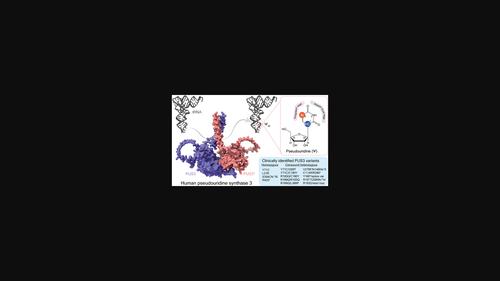当前位置:
X-MOL 学术
›
Hum. Mutat.
›
论文详情
Our official English website, www.x-mol.net, welcomes your feedback! (Note: you will need to create a separate account there.)
Destabilization of mutated human PUS3 protein causes intellectual disability
Human Mutation ( IF 3.9 ) Pub Date : 2022-09-20 , DOI: 10.1002/humu.24471 Ting-Yu Lin 1 , Robert Smigiel 2 , Bozena Kuzniewska 3 , Joanna J Chmielewska 3 , Joanna Kosińska 4 , Mateusz Biela 2 , Anna Biela 1 , Anna Kościelniak 1 , Dominika Dobosz 1 , Izabela Laczmanska 5 , Andrzej Chramiec-Głąbik 1 , Jakub Jeżowski 1, 6 , Jakub Nowak 1 , Monika Gos 7 , Sylwia Rzonca-Niewczas 7 , Magdalena Dziembowska 3 , Rafał Ploski 4 , Sebastian Glatt 1
Human Mutation ( IF 3.9 ) Pub Date : 2022-09-20 , DOI: 10.1002/humu.24471 Ting-Yu Lin 1 , Robert Smigiel 2 , Bozena Kuzniewska 3 , Joanna J Chmielewska 3 , Joanna Kosińska 4 , Mateusz Biela 2 , Anna Biela 1 , Anna Kościelniak 1 , Dominika Dobosz 1 , Izabela Laczmanska 5 , Andrzej Chramiec-Głąbik 1 , Jakub Jeżowski 1, 6 , Jakub Nowak 1 , Monika Gos 7 , Sylwia Rzonca-Niewczas 7 , Magdalena Dziembowska 3 , Rafał Ploski 4 , Sebastian Glatt 1
Affiliation

|
Pseudouridine (Ψ) is an RNA base modification ubiquitously found in many types of RNAs. In humans, the isomerization of uridine is catalyzed by different stand-alone pseudouridine synthases (PUS). Genomic mutations in the human pseudouridine synthase 3 gene (PUS3) have been identified in patients with neurodevelopmental disorders. However, the underlying molecular mechanisms that cause the disease phenotypes remain elusive. Here, we utilize exome sequencing to identify genomic variants that lead to a homozygous amino acid substitution (p.[(Tyr71Cys)];[(Tyr71Cys)]) in human PUS3 of two affected individuals and a compound heterozygous substitution (p.[(Tyr71Cys)];[(Ile299Thr)]) in a third patient. We obtain wild-type and mutated full-length human recombinant PUS3 proteins and characterize the enzymatic activity in vitro. Unexpectedly, we find that the p.Tyr71Cys substitution neither affect tRNA binding nor pseudouridylation activity in vitro, but strongly impair the thermostability profile of PUS3, while the p.Ile299Thr mutation causes protein aggregation. Concomitantly, we observe that the PUS3 protein levels as well as the level of PUS3-dependent Ψ levels are strongly reduced in fibroblasts derived from all three patients. In summary, our results directly illustrate the link between the identified PUS3 variants and reduced Ψ levels in the patient cells, providing a molecular explanation for the observed clinical phenotypes.
中文翻译:

突变的人 PUS3 蛋白的不稳定导致智力障碍
伪尿苷 (Ψ) 是一种 RNA 碱基修饰,普遍存在于许多类型的 RNA 中。在人类中,尿苷的异构化由不同的独立假尿苷合酶 (PUS) 催化。已在神经发育障碍患者中发现人假尿苷合酶 3 基因 ( PUS3 ) 的基因组突变。然而,导致疾病表型的潜在分子机制仍然难以捉摸。在这里,我们利用外显子组测序来鉴定导致人类PUS3中纯合氨基酸取代 (p.[(Tyr71Cys)];[(Tyr71Cys)]) 的基因组变异两个受影响的个体和复合杂合子替换 (p.[(Tyr71Cys)];[(Ile299Thr)]) 在第三个患者中。我们获得了野生型和突变型全长人重组 PUS3 蛋白,并表征了体外酶活性。出乎意料的是,我们发现 p.Tyr71Cys 取代既不影响 tRNA 结合也不影响体外假尿苷化活性,但会严重损害PUS3的热稳定性,而 p.Ile299Thr 突变会导致蛋白质聚集。同时,我们观察到 PUS3 蛋白水平以及 PUS3 依赖性 Ψ 水平在来自所有三名患者的成纤维细胞中显着降低。总之,我们的结果直接说明了已识别的PUS3之间的联系患者细胞中的变体和降低的 Ψ 水平,为观察到的临床表型提供了分子解释。
更新日期:2022-09-20
中文翻译:

突变的人 PUS3 蛋白的不稳定导致智力障碍
伪尿苷 (Ψ) 是一种 RNA 碱基修饰,普遍存在于许多类型的 RNA 中。在人类中,尿苷的异构化由不同的独立假尿苷合酶 (PUS) 催化。已在神经发育障碍患者中发现人假尿苷合酶 3 基因 ( PUS3 ) 的基因组突变。然而,导致疾病表型的潜在分子机制仍然难以捉摸。在这里,我们利用外显子组测序来鉴定导致人类PUS3中纯合氨基酸取代 (p.[(Tyr71Cys)];[(Tyr71Cys)]) 的基因组变异两个受影响的个体和复合杂合子替换 (p.[(Tyr71Cys)];[(Ile299Thr)]) 在第三个患者中。我们获得了野生型和突变型全长人重组 PUS3 蛋白,并表征了体外酶活性。出乎意料的是,我们发现 p.Tyr71Cys 取代既不影响 tRNA 结合也不影响体外假尿苷化活性,但会严重损害PUS3的热稳定性,而 p.Ile299Thr 突变会导致蛋白质聚集。同时,我们观察到 PUS3 蛋白水平以及 PUS3 依赖性 Ψ 水平在来自所有三名患者的成纤维细胞中显着降低。总之,我们的结果直接说明了已识别的PUS3之间的联系患者细胞中的变体和降低的 Ψ 水平,为观察到的临床表型提供了分子解释。



























 京公网安备 11010802027423号
京公网安备 11010802027423号